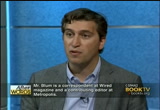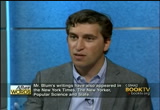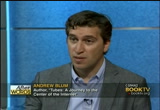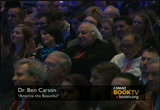tv Book TV After Words CSPAN August 3, 2013 10:00pm-11:01pm EDT
10:01 pm
the former special assistant to the president on science and technology i -- no longer the forefront of the internet revolution. internet capabilities of other countries are faster and cheaper than the west which could threaten america's economic future. this program is about an hour. >> host: susan thank you for being with us. >> guest: i've been looking forward to talking with you. >> host: let's start with the basics. what is the status of broadband in america today? >> guest: the picture at america's quite different from the other developed nations. we have god for very high. >> and download. >> in america cable monopolies and local monopolies in each region of the country dominate that market. and for 85% of americans the only choice with a live will be their local cable monopolies. we don't have any of the fastest 25 cities in the world when it comes to internet access in america so we are not in the
10:02 pm
world's leaders. we are somewhere in the middle of the pack and we also have a deep digital divide so having an internet access at home is very tightly correlated to your socioeconomic status or maybe about half of the people with incomes between 30 and $50,000 a year have it at home and the number is lower for people with incomes under $30,000 a year. rich people tend to have internet access at home and also 9% of americans can't buy internet access wherever they live because it's just unavailable and hasn't been built out of their area so that's a picture. >> host: how did we get here? it seems the u.s. was the inventor of the internet and it dominates google or facebook or apple dominate the internet. what is the divide? >> guest: there is quite a history here so the great thing about the internet is that you can reach anybody. there is a universal addressability system and the whole idea was that the content
10:03 pm
provider like a google would not be subject to the whims of the telecom provider. but we have this huge split between the ideals and the openness of the internet which depend on openness and connectivity and the wires and money of building infrastructure in america so we started off in america with a phone system that was the leader of the world, the envy of the world and then in about the 70s and just giving some history here, the cable industry was launched in america. cable initially was just for one-way entertainment. but as telephone and cable started competing particularly in the late 70's, and cable have a tremendous advantage which was local exclusive franchises and then a law in 1984 that completely deregulated cable. so fast-forward, since 1984 and
10:04 pm
now cable with its model of not being particularly open you know, not being available for addressability everywhere has taken the lead as a financial matter. it's much cheaper to upgrade a cable system than it is to dig up the phone phone wires and replace them with fiber. so we have gotten to this place of local monopolies as a result of just policy vacuums in united states. we got rid of a very long history of common carriage under which the telephone operators had operated. they had to take everything and make sure that it got to the place it wanted to to go and warrant allowed to pick and choose among content. this was a trade-off for the enormous expense it took to build those telephone systems. so here is the deep problem. it's the infrastructure elements that are very expensive to build and operate on huge economies of scale and cable has taken the lead, dominates the market and the telephone companies are
10:05 pm
backing off. as a result of all of this we have no plan to upgrade to those very high speeds around the world that people are getting into cable operators have no particular obligation to serve all of america to close this internal divide. so that is how we got here. its failures in policy which i would like to spell out a more detailed plus the frank economics of how expensive it is to build. it's very difficult to see in a competitive cable showing up right now. >> host: seems that we are in a moment where cable companies would have had to act like telecoms where they like telecoms were they would have to recognize the fcc or whoever whoever's regulating them would have to recognize that cable had to be the same philosophy that apply to telecom for 100 years and that is not the case i would assume. >> guest: that is not the case and hasn't been the case for 30 years. started in 84 we try to clawback a little bit of that in 1982 but there is nothing in the 96 at that would make the mac
10:06 pm
differently so for the last 30 years cable has been building under the assumption that they wouldn't be essentially regulated very much. >> host: wasn't as simple as that? >> guest: basically they see themselves, it's deep in their dna. they see themselves like any private store in the corner. no difference. they have never viewed themselves as a utility subject to these obligations to serve everybody, to serve them at a reasonable cost and to connect with other networks. none of that is part of their ethos is an industry. that was part of the telephone industry but they have lost this battle to americans. they have almost completely backed off and gone into their corner which is wireless. verizon and at&t are mostly wireless companies today. providing wired infrastructure to americans so high prices huge digital divide internally in the country as a whole is sagging in the national compe about
10:07 pm
common carriage and common carriage does seem to be a way of thinking about satisfying some of our needs for broadband. what are the origins of common carriage and how is it executed by the telecom companies? >> guest: this is an ancient regime and goes back to keep operating in the era in europe. the ideas when you hold yourself out to the public and providing an essential transporter communications facility, you are subject to public obligations even though you are a private company. so the whole idea of common carriage which actually came not only from their pet travel through railroads and the telephone industry in 1910 is that in exchange for essentially a private monopoly to provide people with services you take on public -- to charge a reasonable rate to serve everyone and to not discriminate when it comes to content. so yes this regime which still
10:08 pm
exists in law but has not been applied to the cable companies would if applied to our high-speed internet access picture in america fix our problems. >> host: now what are the threats? the threats are just the digital divide and we will get to that but i want to focus to begin with, notion of free and open internet and democracy not just the divide but the possibilities that the isp's and the -- are filtering or snooping. do you put that ahead of the divide? >> guest: these two things fit together. one is a symptom of the other. with no competition essentialessentially for high-speed internet access in america the provider has every incentive and no legal limitations to price discriminate to make sure that it's reaching rich markets and charging as much as they can possibly pay not serving the poor systematically which helps the digital divide issues and
10:09 pm
ensuring that they can provide specialized services, their own video-on-demand whatever it is over their pipe that they charge a lot for her. so the risks really can't be overstated. you can think of the cable pipe is just one big flow of water and pipe is controlled absolutely by the gatekeeper of the cable company. just about four channels are were in our play to internet access of that giant pipe. they are moving to technology that would make the pipe essentially undifferentiated. it's all the same stuff but the gatekeeper, the cable company can pick and choose among communications and look at whatever it wants to send some communications to peco when you thought you were going to chicago all kinds of opportunities for twisting dials that would remove the threat to them of competition and services that they would like to sell to americans.
10:10 pm
so think of anything, home security video whatever it is, cable guys can choose what will be more life to the consumer and can pick and choose among what goes on line and just deliver that to households. it's like living in a gated community. taking the idea of the internet which is all about not having to ask for permission and being able to reach anybody in the world and sticking that on top of an infrastructure which absolutely controls a set of four or five gatekeepers. there is a deep conflict there and the threats are very real. >> host: now you have been restrained so far. your book is very much about the story of comcast. you mentioned for a five cable companies. you haven't mentioned comcast specifically. is the threat you are talking about present or future? are there signs of that sort of threat now or is it more of a concern for the future?
10:11 pm
>> guest: they are careful to restrain themselves so met let me explain. the cable guys fight each other for franchises in the 70s and 80s we call this franchise wars. since then there has been tremendous consolidation in the industry so spot comcast by far the giant. they have 50 million american households in their footprint in 39 states and about 45% of the american population is the within the comcast footprint. they never compete with a big company. they are never in each other's markets. they long ago divided the country among themselves the time warmer has separate markets and is also very big. it's been second with not a distant second but not quite up with comcast and there are a couple of others charter cablevision and cox and in their regions when it comes to high-speed internet access they dominate with the exception of port cablevision which has to fight off a little bit of fiber
10:12 pm
competition but each one stands alone. so the threat is real today to a company like saying netflix. netflix is responsible for about half of internet traffic -- traffic. it's really eating up a lot of traffic but their future is entirely dependent on what the cable companies decide to do with them. whether they make it less convenient for netflix to bring extremes close to people so that they can be seen easily and quickly, whether the cable companies start charging based on usage so that people will start assuming that accessing that will drive their internet access bill, they're bundled bill up even higher so they will drop netflix so their economic future completely dependent and that's just one story of hundreds of thousands that had to do with the power of a single gatekeeper over all information reaching american homes. >> host: in my own exploration
10:13 pm
of the center, the backbone and nationwide international grid networks it's a bit of wild west and there's a lot of competition companies are not particularly profitable but prices are constantly dropping. but then again it's this big stack of fishing nets when at the moment where those backbone networks have to connect to comcast that becomes very contested. yes go right, and this is in small the entire picture. bandwidth should be cheap and it is getting very cheap to carry it long distances and yet because of this bottleneck controlled by a few actors over eyeballs, access to the home they can charge whatever they want. and so where you might see a very contested market between cities, i am not sure that is
10:14 pm
the case because they will start dealing with each other these guys over time but anyway putting that aside even though bandwidth is getting cheaper and storage is getting cheaper and computation is getting cheaper the whole price of the system is going down except for businesses and consumers who have to buy these connections because they are there is absolutely no control over price. and so price, quality and reliability all of that is up for grabs and the cable industry by the way has the lowest rating of consumer satisfaction of any industry in america. >> host: do you think americans will stand for it for very long separate from inventory of policy possibilities? i envision a sort of almost like a organic internet access but a future in which we sort of if there are possibilities for different options where we can choose you know a service that
10:15 pm
if it's not public then perhaps it's transparent or at least it's fast, something that has some spirit of not separate from these giant monopolies. do you think people would choose that if the opportunity were there? >> guest: the assumption behind the question you would have the ability to choose. i'm not sure that makes sense to tell you the truth. we don't for the moment but that's because these services as an economic matter are really a natural monopoly. it's so expensive to build them out initially and then you need a lot of revenue flowing in to pay yourself back for that. and it doesn't make sense to have more than one wire to a home really. so, it's very difficult for competitors to enter this field. it's just like water or electricity. you wouldn't want to have those connections to your home in which to choose. >> host: what is the way out? >> guest: the way out is what other countries are doing which is to ensure that there is a
10:16 pm
fiber to home connection everywhere, that every single citizen has a. just like clean running water and electricity. >> host: fiber to home connection meaning essentially a strand of glass that allows potentially infinite amounts of information. >> guest: infinitely upgradable. what is odd about where we are stuck as a country with the series of monopoly companies is that cable physical connection itself is second best to fiber. cable is a hybrid fiber coaxial and it was built this network for passive consumption of information for being entertained. it can be upgraded to very high download speeds but doesn't upload matter is very crammed in architecture. we think of ourselves as publishing and going to the doctor and all those things we
10:17 pm
should be doing that is going to require a fiber to the home connection and as you said a single thin strand of glass with lasers and light can carry 90,000 tv channels and can be upgraded infinitely evidently as far as we can tell. >> host: you can create more capacity. >> guest: the capacity is infinite. the united states has a deep tradition of private operators building communications networks subject to public obligations. that is where the phone company came from and it works very well and that is where this fiber-optic national network eventually is going to come from. i see a progression. mayors all over the united states are really irritated about the high prices and low capacity networks we are stuck with so they are agitating for fiber to be built to their first
10:18 pm
businesses and then to their consumers homes. that progression is a patchwork across the country that will eventually reach a tipping point of jealousy and awareness in america which will change federal policy and drive towards having an integrated national network but not nationalized, not owned by the government. that is not our tradition and not how we do things but giving private actors are very usable rate of return in exchange for what is essentially a monopoly on services wherever they operate. this works pretty well. we can also, something that happens in many developed countries is say the operator has to be wholesale level only and it's going on in singapore and many european countries and australia. the operator then is obliged to allow lots of retail competitors to reach homes. people call this homes with --
10:19 pm
so imagine you move into a new house in a development somewhere and america decided for utilities. you get water electricity and they hook up to the sewage system and and a choice of internet service providers. they will be traveling to you over a standardized wholesale fiber tail that has been built into your house. this happens in seoul today. if you move into an apartment in seoul you have a choice of three or four fiber to the home providers internet service providers selling you services for 30 or 40 bucks a month for 100 megabits per second which means equal upload and download than they are about to upgrade to faster in seoul so lots of choice, very low prices and a standard wholesale infrastructure across the entire country. it really makes sense. >> host: this is happening in some places in the u.s.. chattanooga is it rate example. can you describe the model and
10:20 pm
what's happening there? >> guest: in chattanooga that electrical utility there decided to upgrade to use their connection to every home the electrical utility to provide a string of fiber into their home and they are doing that. they are selling services to residents. they don't have this retail competition that i've just explained that the utility is in the business of making reasonably priced fiber available to everybody so as result businesses are moving from knoxville to chattanooga and they are very excited. every part of chattanooga's excited because they are getting reasonably priced internet access. >> host: how to the cable companies feel about that? >> guest: they have fought tooth and nail. actually more than 19 states in america is either legal -- illegal or difficult or cities to do this because the existing operators that cable and telephone companies go to the
10:21 pm
statehouses and say city shouldn't be allowed to compete with us is how they put put it and they tried to make it difficult for cities to do this. we have seen that pattern over and over and i'm hopeful that in the next few years some of those laws will be rolled back because it really doesn't make sense to remove the power of self-determination. >> host: what is the logic for it all? clearly is bad for american consumers do not have a choice of cable or fiber. is it purely the power of the body or is it the business argument that they have to invest in their network? is that what it is? >> guest: it gets a lot of traction for saying look we are serving these communities are thickly vile and the city is just going to waste footing and his socialist somehow. there is this air of not letting cities get into this business. we went through exactly the same battle when electricity in the beginning of t 2ntur where cities wanted to run their own venus opal electricity
10:22 pm
systems and the private monopolies that don't do that, that's a terrible waste of the fabric of american society. they are details about those claims in the statehouses but the traction they get is this feeling that government shouldn't be in the business of commissioning internet access service is much less building or owning them and that is enormously attractive to people at a time when government has less and less money. so the contra story is that it's actually very cost-effective for a city to be patient with capital, to guarantee loans to private operators, to build the systems and pay back over several years and then they are free and clear. they are not trapped by a geek who -- gate keepers going to gouge their businesses. >> host: the federal government built the highway system and in the book you say we are driving on gravel roads
10:23 pm
behind a feed truck. does that resonate as an alternative way of thinking about it rather than buying a movie ticket from your private movie theater as you might imagine comcast? >> guest: when i speak to people i say look we made sure there were where always across united states. eisenhower built the federal highway system to connect all americans and not to leave people behind. this is the business of government. for some people that has traction that there is enough fear of government to even be involved in communications that instinctive reaction. this is a very new reaction, you know. today's anniversary the first telegraph sent between boston and new york and in a team 47 and at that point the fathers would have been involved in its wires would have been strong and who would have the right to that franchise.
10:24 pm
today we have nervousness about it. in fact this is the only way, the only way government intervention is the only way to ensure that everybody gets a connection at a reasonable price. we can sell it private actors building and operating the systems that they have to be subject to public oversight. otherwise the incentives just don't align. these companies are people. it's in their interest to maximize their profit by picking perfect neighborhoods that can pay more and more for service and by not taking the risk of running wires out to thinly populated areas and by keeping prices as high as possible. >> host: there is an irony in that endeavor interest are -- over the last 15 years we have suddenly gone from paying 75 cents for a cup of coffee to go into starbucks for a cup of coffee. separate from the digital divide of of the rich import various and even an option for superior service in any form.
10:25 pm
>> guest: that's right. it's interesting. and it's as if all water became bottled. there should just be a flow of communication available to everyone in the country just like electricity. we turn on the lights and we don't even think about it. it's just an input into everything we do as a country. communication should be the same thing but because we have been a little confused there is a lot of fog around this issue people have the sense that internet access is a luxury. what's interesting is that electricity was treated as a lecture he too and early 20th century. everybody said what everybody needs but electricity -- though it decades to change the perception perception of lecture city from one thing to the other. we are in this middle point right now where internet access is still viewed as something slightly magical or expensive but talk to someone who is trying to run a business from his home. for him internet access is just
10:26 pm
like reading. he can't even get going without having bad reasonably priced connection and now there is no option for it. >> host: in the phone rents over the internet now. the internet has a habit of swallowing everything. >> guest: again we shouldn't blow between the layers. the internet is a agreement to speak to another computer using a protocol. i'm talking about this basic infrastructure which used to be used for entertainment from the cable companies. that is not a single line to most american homes being used for absolutely everything. so is the infrastructure that swallowed everything. swallowed internet access. swallowed the use of the phone. the postal system is dying and journalism is having trouble but if the idea of a high-capacity digital wire. it just becomes a platform and one actor in charge of that
10:27 pm
subject and no competition that's pretty disastrous when you think about it. freedom of information and economic growth. i do think that it's a terrible situation that is dragging down the entire united states economy. if every business could depend on this basic reasonablreasonabl e price connectivity we would be doing better as a nation. >> host: the electricity analogy, in some ways the stakes are higher than that because it's not just the light goes on in and the light goes off but it's at the corporate democracy this idea of free information and the free flow of information. >> guest: it should be scary to people that everything they learn think or are influenced by is under the control of a single company. >> host: it isn't though. >> guest: for some reason americans are not marching the streets about this one. >> host: i'm confused by that also. >> guest: a lot of it has to do with of awareness. we are not aware of what's happening in other countries. we don't really care what's
10:28 pm
happening in south korea or sweden or any of the european countries or japan or china. china may be the story that tips this. maybe americans will wake up and say oh oh my god would have begun? china is committed to getting these high-capacity fiber connections to every home as quickly as they can. they are building these homes with cables and they see this as just part of their infrastructure story to create a giant metaclass that consumes lots of stuff, does a lot of that on line. we have no plan to do this and as a result where falling further and further behind. made of that will get americans interested. my goal is to reach as many people -- though i think i can change the world just by educating and they will figure out what to do in their communities to make sure the connectivity and gradually we will do to the point where federal policy of the changes. >> host: that is striking to me that these networks are
10:29 pm
inherently local. we think of the internet is a global network but in fact it's always local and in fact the neighborhood unit is technically speaking a good way of going about these changes. >> guest: it could be. it's just that because the economies of scale of the systems are so great and so cheap want to build the thing it's so cheap to add an additional customer that the neighborhood level may not be the right unit of interest to dig up the streets and install fiber and try to depend on someone else to pick up your communications at a reasonable cost. there are lots of bottlenecks around the neighborhood almost as if you have to go through citywide we are doing this, we are going to make sure that everybody has fiber and then that city is strong enough with all the negotiation to demand reasonable carriage rates from the next provider up the chain the so-called middle mile provider carrying those bits from the city outskirts to the internet backbone.
10:30 pm
i am not sure the neighborhood would --. >> host: i see the opportunity in competition with the middle mile and more technical knowledge of knowing how to connect to the middle mile as a way of opening up as well. certainly in new york where we have -- to new york is a city of abundant bandwidth only to a few buildings. this building is one of them it turns out but to get across the street is a whole another story. i would be curious if there is a way as leveraging the places that are abundant bandwidth. >> guest: that would require government intervention because you would have to force the middle mile providers to let the neighborhood connected them at a reasonable rate. that is tricky. one of them would have to break through the pack in order to do this and warned more even in a dark more and more of those providers are owned by private equity companies who don't have an interest in just offering nondiscriminatory connections
10:31 pm
from neighborhoods. it's not fair. they want their high-capacity connections to businesses where they can make a lot of money. so breaking this whole system open is just, it's on the order of what we had to do with standard oil and what we had to do with roe rhodes with standard oil in roe rhodes, electricity. it takes ultimately national leadership to say this is a problem. we are dramatically under serving the population and falling behind as it a vindication. >> host: who have been the actors in speaking out against that? who are the competitive voices? is that organizations, is a the community broadband organizations? what is it? you have been a strong voice in some ways for this. what is the vacuum there? plans or more organizations thinking about this? >> guest: there actually is a
10:32 pm
movement. it's just not aware of itself but there are lots and lots of municipal efforts around the country, hundreds hundreds of the more individual say oh we have got to fix this. this is just awful. i need a reasonable connection. it's just part of being a respected human being, that is what i need and they are very active in their localities. there is no particular reason for them to be speaking out on a national scale because they are solving their local problem and there is no particular reason for them to be aggregating although i really think they should, because again when you are sitting in a living room you are choosing among physical activity to the internet. you are looking for that service so they haven't been resourced, bound together to form a collective to march on capitol hill. they too often these municipalities march on local or statehouses of representatives of justin march in georgia one
10:33 pm
of these terrible bills was proposed that would have removed the power of cities to elect a to commission a municipal network. everybody in georgia. if there was in that city is very bad wireless signal available to those people the state bill would have said he can't compete with that and in georgia city managers, individuals and representatives throughout the state rose up and defeated that bill so i'm hoping that as a turning point for the state-level efforts. >> host: again there is a contradiction between the infamous local infrastructure and the information white movement. it's surprising again because that is supposedly what the internet does. it binds people across distances and allows them to form those groups but the infrastructure is always local. >> guest: right, and i'm so glad you brought up this point because there something about these dirt and wire fundamental issues that doesn't cross over
10:34 pm
to the people who love the internet and claim to love the internet. i am one of them but they i think still believe you can dig around around the stuff like who cares about washington? i will just build a better mouse trap or some kind of app that will fix this. an app can't fix the economics of infrastructure in america where if we really have a natural monopoly operating companies and the only way to get around it is actually discipline. so the uprising against copyright laws that might have constrained operations on the internet at this higher level was enormous so an explosion. that has not yet crossed over to concern about this dirt and wires problem and that is what i'm trying to hope -- helpful man. >> host: i would like to draw a distinction between mitigation companies and information companies particularly as information companies are
10:35 pm
increasingly in the business of vacation quite literally building infrastructures became also specifically about a company like google which is now a global network. is that communication ursus information, is that it dichotomy you have thought about it all? is that the right way to phrase it? is it a legal way to phrase it? >> guest: we treated telephone companies like communications companies and then we deregulated the entire sector when cable arrived on the scene. if telephone wanted to be treated like cable they would be subject to no rules at all. release us for any possible future role so instead of leveling up to common carriage obligations we level down and now both telephone companies and cable companies are treated like information providers. they are selling it tuna fish
10:36 pm
sandwiches essentially. they are not selling you -- >> host: now very very often a company buys the information from you. >> guest: right, i think you're right to draw attention to the fact that companies that we think of, so we will pick on google. think of google as the use of the internet to provide a search engine functionality and take us quickly to things who want to see. google is experimenting now with actually building fiber networks and they have done this in kansas city and they have announced they are going to do it in austin and provost. they will cover ultimately a small portion of the united states populace. >> host: although they have indicated they might go figure with it. there has been some indication of that. >> guest: we wouldn't want google to do that and we shouldn't wait for them to do that. what we need is an intentional policy that doesn't swap out time warner cable for google,
10:37 pm
exchange one monopoly for another but to provide more oversight and make sure everyone is served. what google is doing is very interesting and disruptive and i don't actually disagree. i don't think they're going to go that far with it. they just want to show that it's possible to make money building fiber to the home under certain conditions. and people love it in kansas city. every part of society in kansas city is talking about this market. it's a big deal. >> host: it's a big deal. again though i have been less restrained about this venue have i think but for me the notion of a single company controlling the post office and also controlling the infrastructure is essentially the creative -- creation of an alternative internet. >> guest: well, compared to what? for me the google experiment is like the world's fair. we could imagine uses of electricity, domestic uses
10:38 pm
particularly until these giant world fairs in the 20 century. people went to visit and they saw electric kitchens and electric kitchens and they saw the ideas of electric appliances totally fine at the time so kansas city for me is the world's fair of very high-capacity standardized connectivity and people are going to live in that an experience it and touch it and feel it and that will drive policy. i'm more interested in the google experiment is a visualization of what is possible. i am concerned and i share your concerns that if you have one after doing everything who is vertically integrated and with content and everything else -- there is a flow of information there. google swears that they are not wearing data from people in kansas city to travel over into building search engines without permission from the people playing the connectivity.
10:39 pm
but i am with you. out walk could break down at any time. as i say they twinkling of this kansas city network is the change that it makes to our perceptions. we don't want products and and we can believe it until we see it and we can see there. >> host: to pick up on your firewall i do want to touch on the nsa and the news over the last month or so now of systematic tapping our collection of information. and again it's striking to me that there was a moment where there was phone tapping. the information was passing by and the nsa or fbi was tapping phones. now it's a different model. information, we don't know the details details but is sensibly taking from google's data center and from facebook's data center
10:40 pm
or microsoft data center. could this be -- doesn't seem -- could this be an alarming moment in the way that ways control freedom and openness of our broadband networks? >> guest: for me this is a continuation of a long history of surveillance by the united states government. it's different in degree but not actually in -- in the 20th century every single telegraph sent from united states to another country was systematically copied by our government and retained. there was widespread domestic surveillance of networks. now today we try to constrain using domestic intelligence surveillance but we have also built networks that carry our innermost thoughts and dreams in ways that telephone calls may not have.
10:41 pm
so we know that the nsa in the past has systematically copied wholesale all internet transmissions going through large exchange points on the coast. they just saved a copy for themselves in case someday they might need it. they are building this gigantic data center in utah to go through all the stuff that they will retain forever. >> host: basically like google's data center basically. >> guest: that is interesting but there are really two actors in the world who understand all of the stuff, the head of nsa in the head of google and they are both very powerful in terms of their ability to transfer information. as a lawyer, that is my background, i would like to see much more process associated with this wholesale surveillance. i don't think it makes sense to be capturing absolutely everything without any reason, without any justification or any legal oversight.
10:42 pm
the second decision would be if we are slowing up everything writing a query against that stuff should only be done with judicial oversight. i agree with you that our intelligence actors are using these pools of data created by google and facebook particularly abroad to just vacuum up, inhale all possible information about people's lives connected to these networks but that is all all -- always happening. it's just that there is more but now than there used to be and we have always relied on judicial frameworks to constrain this insatiable appetite for data and right now all of those -- >> host: it's an amazing asymmetry the head of google and the head of nsa. we talked about the sort of you write at length about the culture of cable and the culture
10:43 pm
of telecom. we talk a lot about the culture of washington. what is the culture of silicon valley? what is their intent with this? >> guest: google and facebook for me are just like espn or these gigantic very successful content companies without which the infrastructure guys can't survive. you always have to think of this is a powerful negotiation. who gets to beat who up so google and facebook need each other. they are sorted in lockstep so for those companies they are not going to rock the boat with this particular policy problem of monopolies and infrastructure. they don't want to say go get that monopoly because they look to a lot of people like a monopoly so they don't want to be in that same sentence so if you are saying silicon valley is google and facebook they keep the status quo in place. they're like giant bullies in the schoolyard who are in their
10:44 pm
particular corners and they have their markets. they don't really beat each other up so the status quo is locked in place with them. i'm hopeful there is another silicon valley which is an upstart, smaller company, companies whose future will be dependent on a lot of information flowing to an addressable market in america that is not subject to one gatekeepers controlled locally. they should really be exercised about this. they should say how can you think of my destiny depends on some cable guy at "30 rock"? they should be ganging together and taking on this issue. here's the problem and this is my third about silicon valley. i love techies. they are my favorite people but they seem to think you can peek around everything and who wants washington? what a drag. let's just build some shiny new thing and that culture is pretty
10:45 pm
ingrained in silicon valley. a beautiful piece in "the new yorker" recently, we assume that the word world will work the way they wanted to and don't have a sense of social conscience of national obligation of you know trying to make sure that everybody gets a reliable, decent standard of living. that is not something to think about. ..
10:46 pm
>> it is interesting we share a pessimistic view of america at the moment but yet it is difficult to catch myself, watching a few movies occasionally does not work but mostly it does do we see the future or are we paranoid? for you i believe it is a backrub steady. >> we suffer from the of poverty of the imagination to show was what it should be like it should be that we
10:47 pm
can be present to anybody in the world at any time that any factory wall could be a screen writer and they bring in people from silicon valley. the very high capacity of the networks make that possible so imagine if you never have to go to the hospital unless a real emergency visited by a fiber access connection to a doctor. we cannot even imagine. >> no delay special networks the cost is the nervous tens
10:48 pm
of thousands of dollars per month. >> hit should not be but those are dedicated companies with dedicated lines but if it was a network in place anybody could so that it should not cost anything it is just like texting. >> stipe is to that scale. >> but the legacy to be satisfied with that but the interaction communicate we should be able to do that we cannot even imagine that now and we fumbled with our phones in we don't realize what we're missing as a result. >> guest: also there of refrain it is good for america.
10:49 pm
and what is your version of what is good for america. [laughter] >> host: just to make sure everybody gets a public education in the hospitals are certified that people are well it is the function to have a decent life in to communicate to be a part of society that everybody gets a reasonably priced communications willis of the is easy as a telephone but then it is forgotten that these lines can travel but they suffer in the show for some reason. >> guest: the question about that you have been talking about these things
10:50 pm
as a law professor and author but what is your address in the your though lone wolf at the moment but to be a part of the sec had you continue this fight? >> with the early internet engineers they're all wonderful people and i am privileged to serve in the white house to be involved in the very high level. i feel it is my dirty but it is as dispassionate in a clear way but with comcast and time warner but just
10:51 pm
10:52 pm
but with a debate of the entire election and the president recently after five years and i did i percent of schools will have fiber connections. that is huge. to see that we care about this. it is inevitable but with the company said could take 90 years it is not in their interests. >> is that where it will come from? >>.
10:53 pm
>> is what they're choosing not to exercise but it could label every provider of high-speed internet access as a common carrier. it has the power to do that. but we have an obligation to serve every betty to connect everybody to every their network it is just administrative labeling. but with that high speed access and the court is likely to say no but don't try to make it up and threw for every roger holder the sec will have a hard choice of what to do.
10:54 pm
to label everyone as a communications provider or to broker a risky deal. and to be terrific and the real backbone he can back if he thinks it is the right thing to do. thank it is coming over the next six or eight months it will be the communication policy we are hoping for the sharp edge but with this to get people activated on the issue and give the sec political cover it needs to change the view and people
10:55 pm
across the country. with but it just has to be used. >> that what it is the power to understand this and asking people what they did what would you say from telecom? >> with the first computer law firm and they did really care wrestle whole idea most important of my time to have been used service or a new business with the standard protocol to let people talk
10:56 pm
to each other across the world? that is amazing. i thought these guys were just irrelevant spending 10 years learning their vocabulary in the acronyms now and the stand what they do and they see it is just about power and money in the natural monopolies that make it very difficult for any competitor but with that ideal that the farmer in mali consulting is online or could sell things but and there should be the global market whenever i could do to help further that vision.
10:57 pm
>> there is a groundswell of people were with silicon valley especially from the start of cited is not always as clear but there are more and more people. >> united states will always be better. we push the network for affirmative foreign policy but because we came up with the best because we were impatient but now we have to push for high-capacity networks butter open to allow for anybody with that new barriers still in effect is a great place to stop. thank you for your time. it was a pleasure. >> the key for having me.
10:58 pm
10:59 pm
neurosurgeon. they thought that was pretty strange and i said when it takes someone to the operating room and they kept the scalp and pull it down and take out of bone volume not -- i am operating on what makes the person who they are. the color does not make them who we are. when will we understand that? [cheers and applause]
11:00 pm
[applause] thanks to all capella books in the carter library this is been on my calendar for several months the daimler looking forward to it and i'm glad to share this with you. to share this with people face to face it is incredible. i want to october 2009. at "new york times" metro section of very little piece haag -- of a porter we can nationalist living in the bronx and the late '60s with the wife and young daughter. the
86 Views
IN COLLECTIONS
CSPAN2 Television Archive
Television Archive  Television Archive News Search Service
Television Archive News Search Service 
Uploaded by TV Archive on

 Live Music Archive
Live Music Archive Librivox Free Audio
Librivox Free Audio Metropolitan Museum
Metropolitan Museum Cleveland Museum of Art
Cleveland Museum of Art Internet Arcade
Internet Arcade Console Living Room
Console Living Room Books to Borrow
Books to Borrow Open Library
Open Library TV News
TV News Understanding 9/11
Understanding 9/11



























































